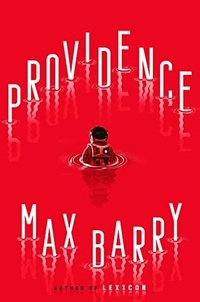The 22 Murders of Madison May by Max Barry
 Wednesday, June 30, 2021 at 6:30AM
Wednesday, June 30, 2021 at 6:30AM 
Published by G.P. Putnam's Sons on July 6, 2021
The “many worlds” theory of parallel universes lends itself to many stories by science fiction writers. The 22 Murders of Madison May is the latest parallel universe story. The novel is apparently being developed as a television series. Television might be its natural element.
Madison “Maddie” May is an actress who was cast in a film that gave her career a jump start. Sadly for her, a fan named Clayton Hors sees the movie and falls in love with her. Clayton has a portal, a device that allows him to travel from one universe to another when the universes happen to be bumping against each other, an event that happens once every 30 hours. As Clayton journeys from universe to universe, he searches out the Maddie in each new place he visits. She’s never quite the woman he fell in love with — she’s usually not an actress at all, or at least not a successful one. Clayton feels betrayed by his encounters with Maddie and invariably kills her and moves on to the next universe. He’s done this about twenty times when the novel starts.
A group of people who have also acquired portal devices are moving through universes, following the path that Clayton creates. How this happens is the subject of a muddled explanation that requires travelers to acquire anchor points known as “moorings” to assure they will end up on a similar world (as opposed to, for example, travel to a universe where Earth doesn’t exist or has a noxious atmosphere). Where and how the travelers acquired portals and why they banded together are unanswered questions. While science fiction requires the suspension of disbelief, some writers try to provide a credible, science-based explanation so that the reader will not be discomforted by accepting unlikely realities. Max Barry doesn’t bother with credible explanations, but this isn’t the kind of science-based story that demands them.
It is instead a story of good guys chasing a bad guy. Clayton is the bad guy. The primary good guys are Hugo Garrelly (who really isn’t all that good) and Felicity Staples. Hugo is one of the travelers who has a portal. Hugo is chasing Clayton through various universes in an attempt to save various Maddies, hoping in the process to get ahead of him so that Clayton can be stopped. Felicity is a reporter who, quite against her will, joins Hugo on his travels.
The rules of physics that govern that novel posit that a new arrival in a dimension will replace that person’s existing counterpart. The novel’s most interesting aspect involves Felicity’s reaction to the lives that her counterpart was living as she enters each new universe. She has the same significant other in each, but they aren’t identical. One likes to cook. One has a beard. One is learning to make shoes. One largely ignores her while another is surprisingly attentive. Naturally enough, she likes the attentive one. But when she leaves a universe she leaves nothing behind. While she feels guilty about abandoning her significant others, Hugo gives her little choice.
Also of interest is the notion that the dimensional travelers might be motivated by the desire, not just to stop various Maddies from being murdered (there are an infinite number of Maddies, after all, so a couple of dozen deaths are inconsequential in the grand scheme of things), but to spread good things (such as music and art) from worlds where they exist to worlds where they don’t, making worlds better, one world at a time. The notion is never fully explored because it might not be consonant with the actual intent of the travelers.
At bottom, The 22 Murders of Madison May is an entertaining chase novel, with interdimensional portals substituting for the airplanes and fast cars that usually facilitate chases. Felicity and each of the Maddies are likable. Their character development isn’t deep but it isn’t shallow. Each incarnation of Madison makes her sympathetic — the reader might feel sad that she’s probably going to die, given her persistent determination to live a better life — while Felicity’s moral struggle (as well as her career struggles) make her an appealing character. Clayton is a basic sociopath who probably doesn’t need any more characterization than his obsession with Maddie. The plot isn’t complex but it isn’t overly simplistic, despite the absence of any real explanation for the underlying premise of interdimensional travelers and their mysterious portals.
The novel has the feel of being thrown together to meet a deadline without taking the time to flesh out the story’s premise. Maybe it was thrown together in anticipation of selling the story to television. After all, few television shows worry about whether the premise makes sense. Max Barry could have written a better novel, as he’s done in the past, but The 22 Murders of Madison May has sufficient entertainment value to qualify as a decent beach read.
RECOMMENDED
